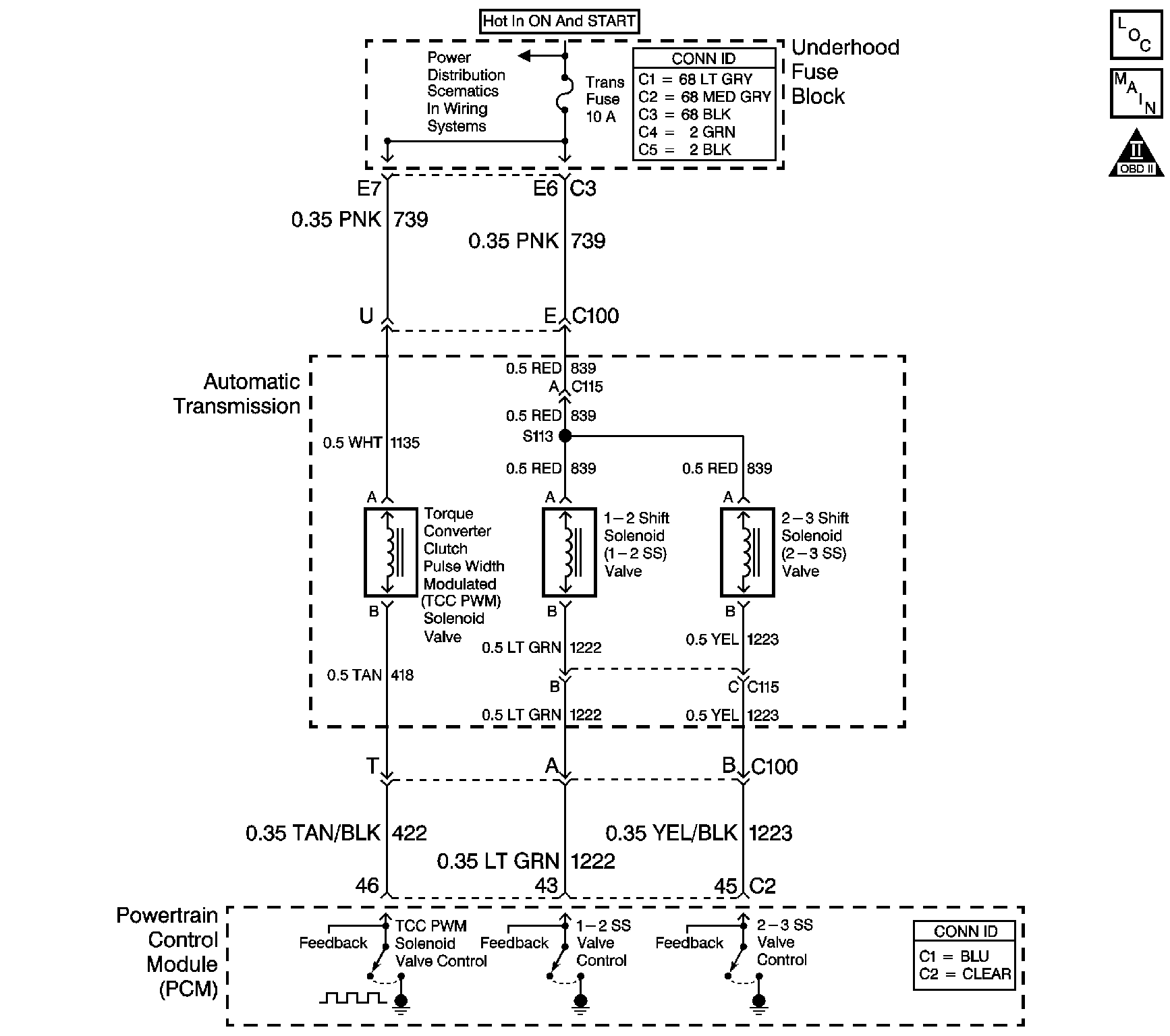
Circuit Description
The 2-3 shift solenoid (SS) valve controls the transmission fluid pressure acting on the 1-2 and 2-3 shift valves to position the valves for the appropriate gear. The 2-3 SS valve is a normally open exhaust valve located on the lower control valve body. Ignition voltage is supplied to the solenoid. The output driver module (ODM), within the PCM, commands the solenoid ON or OFF by providing a ground path. When the 2-3 SS valve is commanded ON, the PCM senses low voltage. When the 2-3 SS valve is commanded OFF, the PCM senses high voltage.
If the PCM detects a continuous short to voltage in the 2-3 SS valve circuit, then DTC P1847 sets. DTC P1847 is a type A DTC.
Conditions for Running the DTC
| • | The system voltage is 8-18 volts. |
| • | The engine run time is greater than 5 seconds. |
| • | The PCM commands the 2-3 SS valve ON. |
Conditions for Setting the DTC
The 2-3 SS valve feedback circuit indicates a continuous short to voltage for 4.3 seconds.
Action Taken When the DTC Sets
| • | The PCM illuminates the malfunction indicator lamp (MIL). |
| • | The PCM commands an immediate landing to 2nd gear. |
| • | The PCM commands maximum line pressure. |
| • | The PCM inhibits TCC engagement |
| • | The PCM freezes transmission adapt functions. |
| • | The PCM records the operating conditions when the Conditions for Setting the DTC are met. The PCM stores this information as Freeze Frame and Failure Records. |
| • | The PCM stores DTC P1847 in PCM history. |
Conditions for Clearing the MIL/DTC
| • | The PCM turns OFF the MIL during the third consecutive trip in which the diagnostic test runs and passes. |
| • | A scan tool can clear the MIL/DTC. |
| • | The PCM clears the DTC from PCM history if the vehicle completes 40 warm-up cycles without an emission-related diagnostic fault occurring. |
| • | The PCM cancels the DTC default actions when the ignition switch is OFF long enough in order to power down the PCM. |
Test Description
The numbers below refer to the step numbers on the diagnostic table.
-
This step tests the PCM and the wiring to the transmission.
-
This step verifies that the circuit has the correct resistance.
Step | Action | Value(s) | Yes | No | ||||
|---|---|---|---|---|---|---|---|---|
1 | Did you perform the Powertrain Diagnostic System Check? | -- | Go to Step 2 | Go to Diagnostic System Check - Engine Controls in Engine Controls | ||||
2 |
Important: Before clearing the DTC, use the scan tool in order to record the Freeze Frame and Failure Records. Using the Clear Info function erases the Freeze Frame and Failure Records from the PCM. When 3rd or 4th gear is commanded, does the scan tool display indicate a short to voltage? | -- | Go to Step 3 | Go to Intermittent Conditions in Engine Controls | ||||
Refer to Automatic Transmission Inline Harness Connector End View . Is the test lamp ON? | -- | Go to Step 4 | Go to Step 5 | |||||
4 | Test the control circuit (CKT 1223) of the 2-3 SS valve for a short to voltage between the PCM connector C2 and the AT inline 20-way connector. Refer to Circuit Testing and Wiring Repairs in Wiring Systems. Did you find and correct the condition? | -- | Go to Step 11 | Go to Step 10 | ||||
Refer to Automatic Transmission Inline Harness Connector End View . Is the resistance within the specified range? | 20-40 ohms | Go to Step 7 | Go to Step 6 | |||||
6 |
Is the resistance less than the specified value? | 100 ohms | Go to Step 8 | Go to Step 9 | ||||
7 | Measure the resistance between terminal B and all other terminals, except terminals A and E, of the J 44152 . Refer to Automatic Transmission Inline Harness Connector End View . Is the resistance between terminal B and any other terminal, except terminals A and E, less than the specified value? | 100 ohms | Go to Step 8 | Go to Intermittent Conditions in Engine Controls | ||||
8 |
Important: The automatic transmission wiring harness consists of two separate harnesses, the Automatic Transmission Wiring Harness Assembly, GM P/N 15320475, and the Automatic Transmission Wiring Extension Harness Assembly, GM P/N 15320478. In order to avoid the unnecessary replacement of parts, determine which harness contains the fault and replace only that harness. Replace the automatic transmission wiring harness. Refer to Transmission Overhaul in the 4T80-E section of the Transmission Unit Repair Manual. Did you complete the replacement? | -- | Go to Step 11 | -- | ||||
9 | Replace the 2-3 SS valve. Refer to Solenoid B Replacement. Did you complete the replacement? | -- | Go to Step 11 | -- | ||||
10 | Replace the PCM. Refer to Powertrain Control Module Replacement in Engine Controls. Did you complete the replacement? | -- | Go to Step 11 | -- | ||||
11 | Perform the following procedure in order to verify the repair:
Has the test run and passed? | -- | System OK | Go to Step 1 |
